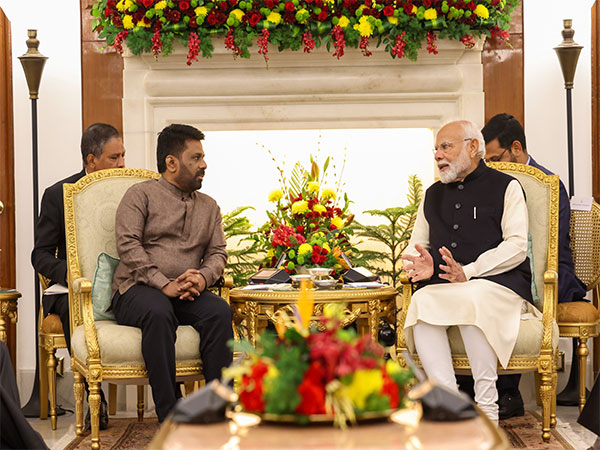
New Delhi: Sri Lanka is set to witness a significant milestone in its energy and economic collaboration with India as Prime Minister Narendra Modi prepares to visit the island nation from April 4 to 6, at the invitation of President Anura Kumara Dissanayake.
Addressing the Sri Lankan parliament on March 21, President Anura Kumara Dissanayake announced that Modi is visiting Sri Lanka for the 'stability of the country'. He said that construction work on the Sampur Power Plant in Trincomalee will commence concurrently with Modi's visit, highlighting the stability of Sri Lanka as a key factor in fostering international partnerships.
Modi's agenda in Sri Lanka
During his visit, Modi and Dissanayake will inaugurate several India-assisted projects, including the NTPC Sampur Solar Project, which is a collaborative initiative between India's National Thermal Power Corporation (NTPC) and Sri Lanka's Ceylon Electricity Board (CEB). Located in Sampur, Trincomalee, this project marks a significant shift from the previously planned coal power plant at the same site. The solar power project is being implemented in two stages: the first phase involves a 50 MW solar power plant, while the second phase will add another 70 MW, bringing the total capacity to 120 MW. The Sampur project is expected to play a crucial role in addressing Sri Lanka's energy needs while strengthening bilateral ties between the two countries.
The leaders will also exchange multiple Memorandums of Understanding (MoUs) covering energy connectivity, digitisation, health, and multi-sectoral grant assistance. Modi's itinerary includes a visit to the historic city of Anuradhapura, where he and Dissanayake will pay respects at the Mahabodhi temple and launch two India-assisted projects, potentially including a railway initiative.
Modi is expected to address the longstanding fishermen issue during his talks with Dissanayake. Tamil Nadu Chief Minister M.K. Stalin has urged Modi to sign a new agreement with Sri Lanka to protect the rights of Tamil Nadu fishermen near Katchatheevu. The issue, involving arrests and boat seizures by the Sri Lankan Navy, remains a critical point of contention, with calls for constructive engagement to find a lasting solution.
Possible revival of renewable energy projects
While reports indicate that Adani’s port project in Sri Lanka may be inaugurated by Prime Minister Narendra Modi during his upcoming visit to the Island Nation, could it also influence the outcome of the Adani Green Energy (AGEL) projects in northern Sri Lanka? Though no official confirmation has been made, the renewable project, which faced challenges due to tariff disagreements and was withdrawn by Adani, remains a topic of interest during bilateral discussions.
During a recent televised discussion, former President Ranil Wickremesinghe expressed disappointment over the Dissanayake-led government's handling of the renewable energy project in Mannar with Adani. Dissanayake defended the National People's Power (NPP) coalition government's decision to renegotiate the purchasing price, stating that alternative bids for renewable energy projects offered prices significantly lower than Adani's proposed rate of 8.26 US cents per unit. In late December 2024, the new cabinet opted to renegotiate the purchasing price citing concerns over corruption and high costs. Adani, in response, withdrew from the $400 million project after incurring a five-million-dollar expenditure.
The Adani Group remains interested in reviving its $1-billion renewable energy power project in Sri Lanka, despite announcing its withdrawal in February 2025. Sources suggest ongoing negotiations between Adani Green Energy and the Sri Lankan government over tariff rates, with a tentative agreement of 7 cents per kWh being discussed, compared to the originally proposed 8.26 cents.
The Indian government reportedly views this project as a strategic investment, advocating for its continuation. The project, which includes 484 MW wind farms at Mannar and Pooneryn and related transmission network expansion, had stalled due to tariff disagreements and a review initiated by President Anura Kumara Dissanayake's government. Adani has already invested $5 million in pre-development activities, but discussions broke down over costs. While the company wrote to Sri Lanka’s Board of Investment about withdrawing, it left the possibility of future collaborations open and retained most regulatory clearances, excluding environmental approval in Mannar. If the ongoing talks succeed, work may begin as early as June 2025.
Defence Cooperation and Economic Recovery
Interestingly, Foreign Secretary Vikram Misri indicated that an MoU on defence cooperation is on the horizon, marking a monumental shift in the trajectory of India-Sri Lanka relations, symbolising a departure from the contentious past of the Indian Peace Keeping Force's withdrawal over three decades ago. It reflects the evolving dynamics between the two nations, particularly in the face of China's growing influence in the Indian Ocean Region. Although the finer details of the pact remain under wraps, it is expected to elevate bilateral defence ties.
Economically, the ties remain robust, with bilateral trade reaching $5.5 billion in 2023-24 and cumulative Indian investments standing at $2.2 billion. India has played a crucial role in Sri Lanka's economic recovery, particularly during the severe crisis of 2022. By extending $20.66 million in grant assistance to settle payments for seven completed line-of-credit projects and converting repayments into grants, India has demonstrated its unwavering support. The rehabilitation of Kankesanthurai Port, valued at $61.5 million, will also be executed as a grant, underscoring India's commitment to development in Sri Lanka. Earlier, India’s assistance of nearly $4 billion during 2022-2023 proved instrumental in stabilizing Sri Lanka’s economy, complemented by collaboration with the IMF on debt restructuring. As co-chair of the Official Creditors Committee, New Delhi continues to play a vital role in these efforts.
President Dissanayake's choice of India for his inaugural overseas visit after assuming office in 2024 underscored a deliberate effort to align Colombo's approach with New Delhi's sensitivities and strategic concerns in the Indian Ocean Region. In a reciprocal gesture, Modi, visiting in close succession, will become the first foreign leader to be hosted by Dissanayake, reflecting the significance both leaders attach to their bilateral ties.